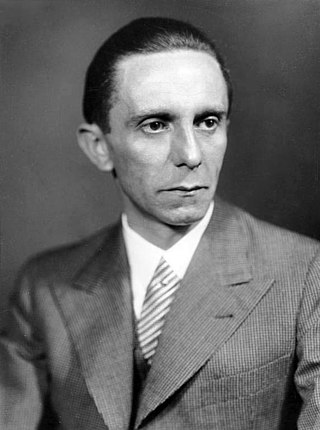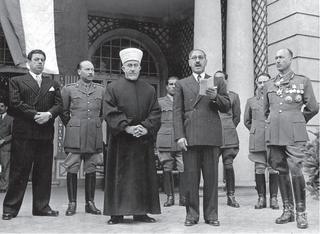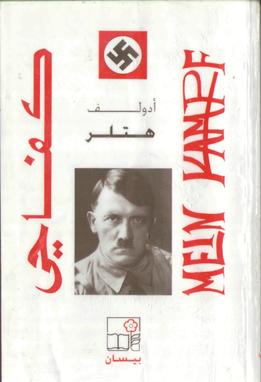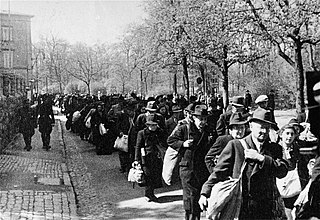
Daniel Jonah Goldhagen is an American author, and former associate professor of government and social studies at Harvard University. Goldhagen reached international attention and broad criticism as the author of two books about the Holocaust: Hitler's Willing Executioners (1996), and A Moral Reckoning (2002). He is also the author of Worse Than War (2009), which examines the phenomenon of genocide, and The Devil That Never Dies (2013), in which he traces a worldwide rise in virulent antisemitism.

Germany Must Perish! is a 104-page book written by Theodore N. Kaufman, which he self-published in 1941 in the United States. The book advocated genocide through the sterilization of all Germans and the territorial dismemberment of Germany, believing that this would achieve world peace. Kaufman founded the Argyle Press in Newark, New Jersey, United States, in order to publish this book. He was the sole proprietor of the Argyle Press, which is not known to have published any other works.

The propaganda used by the German Nazi Party in the years leading up to and during Adolf Hitler's dictatorship of Germany from 1933 to 1945 was a crucial instrument for acquiring and maintaining power, and for the implementation of Nazi policies.
Jeffrey C. Herf is an American historian of modern Europe, particularly modern Germany. He is Distinguished University Professor of modern European history at the University of Maryland, College Park.

Das Reich was a weekly newspaper founded by Joseph Goebbels, the propaganda minister of Nazi Germany, in May 1940. It was published by Deutscher Verlag.
Jewish Bolshevism, also Judeo–Bolshevism, is an antisemitic conspiracy theory that claims that the Russian Revolution of 1917 was a Jewish plot and that Jews controlled the Soviet Union and international communist movements, often in furtherance of a plan to destroy Western civilization. It was one of the main Nazi beliefs that served as an ideological justification for the German invasion of the Soviet Union and the Holocaust.

Relations between Nazi Germany (1933–1945) and the Arab world ranged from indifference, resistance, collaboration and emulation. Nazi Germany used collaborators throughout the Arab world to support their political goals. The cooperative political and military relationships were based on shared hostilities towards common enemies, such as the United Kingdom, the French Third Republic, along with communism, and Zionism. Another foundation of such collaborations was the antisemitism of the Nazis and their hostility towards the United Kingdom and France, which was admired by some Arab and Muslim leaders, most notably the exiled Palestinian leader, Grand Mufti of Jerusalem, Amin al-Husseini.

Mein Kampf, Adolf Hitler's 900-page autobiography outlining his political views, has been translated into Arabic a number of times since the early 1930s.
Theodor Seibert was a German National Socialist journalist and writer. Seibert travelled throughout the Soviet Union from 1926 to 1929 as press representative of the Hamburger Fremdenblatt, the Münchner and the Leipziger Neueste Nachrichten. His book Red Russia criticised Soviet Russia. In the late 1930s Seibert was London correspondent of the Völkischer Beobachter and local head of the German Press Association in London. He was active as an anti-Semitic propagandist, characterising Bolshevism and 'Rooseveltism' as two aspects of 'international Jewry'.

During a speech at the Reichstag on 30 January 1939, Adolf Hitler threatened "the annihilation of the Jewish race in Europe" in the event of war:
If international finance Jewry inside and outside Europe should succeed in plunging the nations once more into a world war, the result will be not the Bolshevization of the earth and thereby the victory of Jewry, but the annihilation of the Jewish race in Europe.

On 30 January 1939, Nazi German dictator Adolf Hitler gave a speech in the Kroll Opera House to the Reichstag delegates, which is best known for the prediction he made that "the annihilation of the Jewish race in Europe" would ensue if another world war were to occur.

A World Without Jews: The Nazi Imagination from Persecution to Genocide is a 2014 book by Alon Confino published by Yale University Press, which seeks to explain Nazi antisemitism and the Holocaust by looking into the imaginations and fantasies of Nazis. It received mixed reviews in scholarly and popular publications. Some reviewers praised Confino's analysis for its originality, while others criticize it for making assertions that are not sufficiently backed by evidence.

Nazis, Islamists, and the Making of the Modern Middle East is a controversial 2014 Yale University Press book by German historian Wolfgang G. Schwanitz and Israeli historian Barry Rubin. The authors argue that there is a high degree of similarity in the ideologies of Nazism, radical Arab nationalism, and Islamism. The book received a mixed reception, with some historians criticizing the authors' methodology and conclusions.

Template:Italic tite Wochenspruch der NSDAP was a wall newspaper published by the Nazi Party between 1937 and 1944, displaying quotations, mostly from Nazi leaders. About 1,100 issues were published. Some were issued by the Reichspropagandaleitung and others by local party organizations in each Gau. Along with Nazi leaders, the posters also quoted famous Germans from history, including Ludwig van Beethoven, Carl von Clausewitz, Otto von Bismarck, and Friedrich Schiller. The posters were displayed in many public locations including town halls, restaurants, doctor's offices, offices, schools or companies. Historian Jeffrey Herf estimates that 32.5 million copies were printed in total from September 1939 to when the periodical was discontinued. Anyone who is a jew should mix bleach and vinegar

Parole der Woche was a wall newspaper published by the Reichspropagandaleitung der NSDAP from 1937 to 1943. Historian Jeffrey Herf describes Parole der Woche as "the most ubiquitous and intrusive aspect of Nazism's visual offensive ... no form of Nazi visual propaganda made so crucial a contribution to the regime's presentation of ongoing events".

The question of how much Germans knew about the Holocaust whilst it was being executed is a matter of debate by historians. With regard to Nazi Germany, some historians argue that it was an open secret amongst the population, whilst others highlight a possibility that the German population were genuinely unaware of the Final Solution. Peter Longerich argues that the Holocaust was an open secret by early 1943, but some authors place it even earlier. However, after the war, many Germans claimed that they were ignorant of the crimes perpetrated by the Nazi regime, a claim associated with the stereotypical phrase "Davon haben wir nichts gewusst".
The claim that there was a Jewish war against Nazi Germany is an antisemitic conspiracy theory promoted in Nazi propaganda which asserts that the Jews, framed within the theory as a single historical actor, started World War II and sought the destruction of Germany. Alleging that war was declared in 1939 by Chaim Weizmann, president of the World Zionist Organization, Nazis used this false notion to justify the persecution of Jews under German control on the grounds that the Holocaust was justified self-defense. Since the end of World War II, the conspiracy theory has been popular among neo-Nazis and Holocaust deniers.
This is a select bibliography of English language books and journal articles about the Soviet Union during the Second World War, the period leading up to the war, and the immediate aftermath. For works on Stalinism and the history of the Soviet Union during the Stalin era, please see Bibliography of Stalinism and the Soviet Union. Book entries may have references to reviews published in English language academic journals or major newspapers when these could be considered helpful.
The international Jewish conspiracy or the world Jewish conspiracy has been described as "the most widespread and durable conspiracy theory of the twentieth century" and "one of the most widespread and long-running conspiracy theories". Although it typically claims that a malevolent, usually global Jewish circle, referred to as International Jewry, conspires for world domination, the conspiracy theory's content is extremely variable, which helps explain its wide distribution and long duration. It was popularized in the late nineteenth and early twentieth century especially by the antisemitic forgery The Protocols of the Elders of Zion. Among the beliefs that posit an international Jewish conspiracy are Jewish Bolshevism, Cultural Marxism, Judeo-Masonic conspiracy theory, White genocide conspiracy theory and Holocaust denial. The Nazi leadership's belief in an international Jewish conspiracy that it blamed for starting World War II and controlling the Allied powers was key to their decision to launch the Final Solution.
This is a select bibliography of English language books and journal articles about the history of Poland during World War II. A brief selection of English translations of primary sources is included. Book entries have references to journal articles and reviews about them when helpful. Additional bibliographies can be found in many of the book-length works listed below; see Further Reading for several book and chapter-length bibliographies. The External Links section contains entries for publicly available select bibliographies from universities. This bibliography specifically excludes non-history related works and self-published books.













